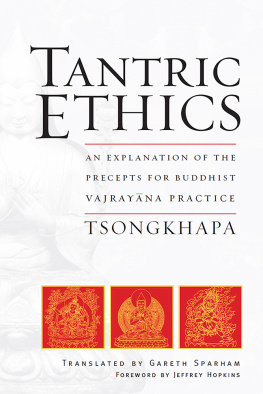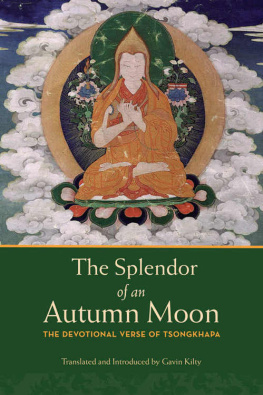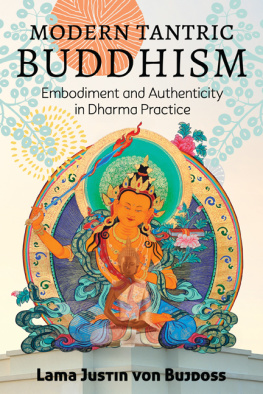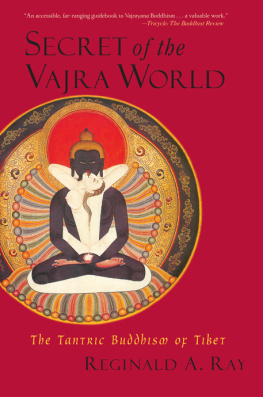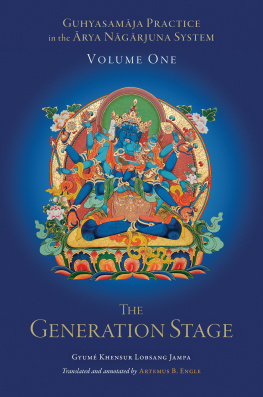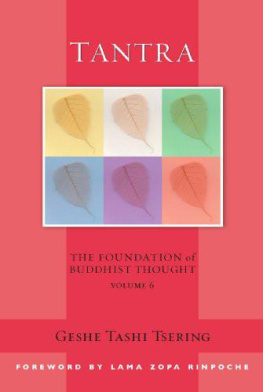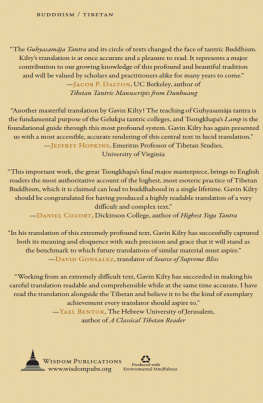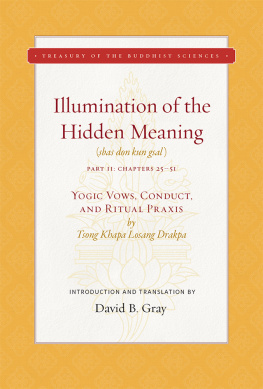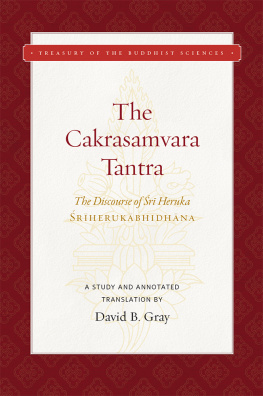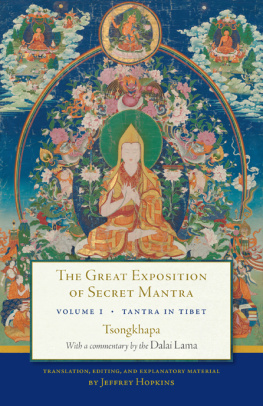C ENTRAL TO THE BUDDHISM OF TIBET are the esoteric techniques of the tantric, or Vajrayna, tradition. These practices involve recitation of mantras and complex visualizations and are passed from teacher to student during sacred initiation ceremonies. Tantra constitutes the fabric of a Tibetan Buddhists daily practice, but it cannot be successful without adherence to the tantric precepts, the code of ethical behavior for aspirants on the Vajrayna path. The tantric vows are the highest of three complementary sets of vows in Tibetan Buddhism, following the Prtimoka (monastic) and Mahyna vows.
The scholar and tantric adept Tsongkhapa (13571419), one of the greatest philosophers produced by Tibets Buddhist culture, composed works on every aspect of Buddhist philosophy and practice. This book contains a translation of his Fruit Clusters of Siddhis, an explanation of the tantric vows, and provides a clear explanation of the nature of each vow and the criteria for determining when a downfall has occurred.
GARETH SPARHAM was a Tibetan Buddhist monk for more than twenty years. He holds a Ph.D. in Asian Studies from the University of British Columbia. He has translated and edited works by Tsongkhapa previously in his books The Fulfillment of All Hopes: Guru Devotion in Tibetan Buddhism and Ocean of Eloquence: Tsong kha pas Commentary on the Yogcra Doctrine of Mind. He currently teaches Tibetan language at the University of Michigan in Ann Arbor.
Wisdom Publications, Inc.
199 Elm Street
Somerville MA 02144 USA
wisdompubs.org
2005 by Gareth Sparham
All rights reserved.
All rights reserved. No part of this publication may be reproduced, stored in a retrieval system or transmitted in any form by any means without the prior permission of the copyright owner. Enquiries should be made to the publisher.
Library of Congress Cataloging-in-Publication Data
Tso-kha-pa Blo-bza-grags-pa, 13571419.
Tantric ethics : an explanation of the precepts for Buddhist Vajrayana practice / Tsongkhapa ; translated by Gareth Sparham ; foreword by Jeffrey Hopkins. 1st Wisdom ed.
p. cm.
Includes bibliographical references and index.
The full title is: Fruit clusters of siddhis, an explanation of the way Bodhisattvas following the Bodhisattvas way of life by means of secret mantra should make their training in morality completlely pure Pref.
ISBN 0-86171-290-0 (pbk. : alk. paper)
1. Spiritual life Tantric Buddhism Early works to 1800. 2. Buddhist ethics Early works to 1800. 3. Tantric Buddhism Discipline Early works to 1800. 4. Buddhism China Tibet Doctrines Early works to 1800. I. Sparham, Gareth. II. Title.
BQ7950.T754T37 2005
294.3'5 dc2 22005016789
First Wisdom Edition
ISBN 978-0-86171-290-0 ebook ISBN 978-0-86171-780-4
09 08 07 06 05
5 4 3 2 1
Cover Art: Tsong Khapa, Chahar, Inner Mongolia, c.1700. Gilt brass, with pigments. Folkens Museum Etnografiska, Stockholm. Photograhy by John Bigelow Taylor, NYC. Cover and interior design by Gopa & Ted2, Inc. Set in Sabon 9.8/14 pt.
Publishers Acknowledgment
T HE PUBLISHER gratefully acknowledges the generous help of the Hershey Family Foundation in sponsoring the printing of this book.
Foreword
T SONGKHAPA LOBSANG DRAGPA (13571419) is one of the most gifted philosophers and religious leaders produced by Tibets Buddhist culture. In his Great Exposition of Secret Mantra, his seminal discourse on the practice of tantra, Tsongkhapa refers readers wishing to understand the crucial topic of tantric morality to another of his works, Explanation of Tantric Morality Called Fruit Clusters of Siddhis. That text is the subject of the present book.
The tantric vows merit separate treatment both for their importance and for their complexity. Without keeping the vows, the sought-after results of tantric practice are impossible to achieve, and so understanding what these commitments entail is crucial. The complexity lies in the many cryptic terms used to enumerate and explain the vows as well as in the divergent traditions of commentaries on their meaning. Tsongkhapa addresses these points in detail, yielding a rich picture of the Indian sources and a nuanced explanation of this cornerstone of tantric practice.
In Tantric Ethics, Gareth Sparhams lucid translation and introduction make this essential material available to practitioner and scholar alike. Only a scholar with his long familiarity with Tibetan religious life and Buddhist doctrine could be a reliable guide to this treasure. It is with pleasure that I highly recommend this work to interested readers.
Jeffrey Hopkins
University of Virginia
Preface
I BEGAN WORK on this book more than twenty-five years ago in McLeod Ganj, India, with Denma Locho Rinpoche, a tantric guru distinguished as such both in terms of social status (he is recognized by Tibetans to be the reincarnation of an earlier tantric adept) and in terms of the personal effort he devotes to his practice. He read through the text with me and answered many questions that I put to him about it. I wish to thank him and acknowledge him as the senior collaborator in this project. I was also helped at that time by Lobsang Gyatso, a dear friend and mentor, and by many other learned Tibetan lamas. I am grateful for their generosity of spirit and thank them for their help.
I set the rough draft that I had produced aside for many years with the hope that Professor Jeffrey Hopkins or one of his students at the University of Virginia might make use of my notes to bring out an authentic translation. When it became clear that others were too busy, I returned to the work in the mountains in Dharmkot, above McLeod Ganj, in the early 1990s, a very lucky period of my life. I thank the Tibetan meditators and scholars who helped me in those years, and the Gaddi villagers there for making me welcome. I am also grateful to Nga-hua Yeo of West Vancouver, Canada, for her kindness as a benefactor to me as a monk during those years. I returned again to complete the project a few years ago in Ann Arbor, Michigan, carefully revising the translation and writing a new introduction. I would like to thank the scholars and staff of the Department of Asian Languages and Cultures at the University of Michigan, where I work teaching Tibetan language. In particular, I thank Professor Donald Lopez for his consistent support.
I also thank the editors at Wisdom Publications: first Dr. Nicholas Ribush for insisting that I publish this work with Wisdom, second Dr. Gene Smith, who pushed for necessary improvements in the text, and finally the present editors who have guided the book to publication.
Finally, I would like to thank Professor Jeffrey Hopkins. The catalyst for my work on this text was his translation of Tsongkhapas Ngagrim Chenmo, published as Tantra in Tibet and Yoga in Tibet. I have never had the good fortune to study formally with Professor Hopkins, and he has not been involved in the preparation of this translation, but he was a benefactor and friend to me as a monk and student when I returned from India to do graduate work at the University of British Columbia in the 1980s, and he always welcomed me to his home. I am inspired by his enlightened attitude toward scholarship.
Introduction
Comparing the proscriptions and prohibitions between the higher and lower vehicles and between the stra and tantra, one finds many dissimilarities. For those who are confused and lack the power of intelligence to seek the intended meaning of the innumerable scriptures, that these are all the practices of a single person is contradictory. Yet, through wisdom, the learned know that these are not mutually exclusive. There are limitless things the unwise see as contradictory and the wise know to lack contradiction.

